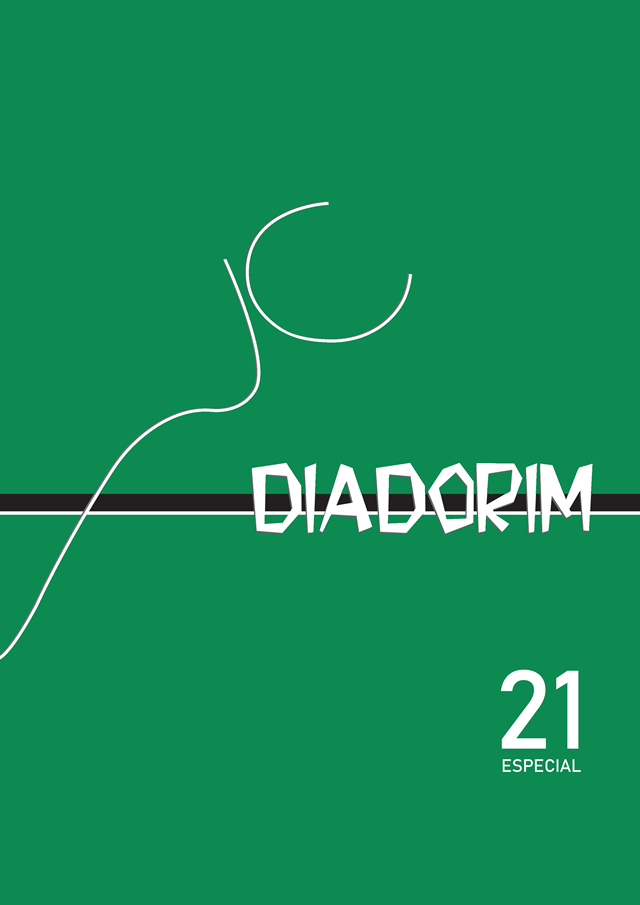The Local-Global Novel
DOI:
https://doi.org/10.35520/diadorim.2019.v21nEspa28319Palabras clave:
Literatura Mundial, o Romance Global, Ficção no Século XXIResumen
There are certain events, John Tomlinson (1999) argues, such as the fallout in Chernobyl, the fall of the Berlin wall, the collapse of the communist world, the creation of the European Union, global summits on climate change, wars in Beirut, the Gulf, Somalia, or Bosnia, that “may add to the extension of the individual’s ‘phenomenal world’”. Such is the case for the characters in Michel Laub’s trilogy of novels: Diário da queda (2011), A maçã envenenada (2013), and O tribunal da quinta-feira (2016). In these novels, global catastrophes (the Holocaust, the Rwandan genocide, and the A.I.D.S epidemic) are juxtaposed, both formally and narratively, with the personal tragedies suffered by their protagonists, thus creating an analogous relationship with the local/global dialectic. This paper studies Laub’s trilogy as global novels, seeking to subvert the market term by adding the “local” modifier, in an attempt to understand the nature of world literature in the twenty-first century. The Local-Global Novel, of the kind produced by Laub, complicates Anderson’s (1983) notion of nations as imagined communities by adopting the world as a community in which individuals, and their narratives, can be seen as singular-plural (NANCY, 1996).
Descargas
Citas
ANDERSON, B. Imagined Communities: Reflections on the Origin and Spread of Nationalism. London: Verso, 2006.
BIRD, J.(ed.). Mapping the Futures: Local Cultures, Global Change. London: Routledge, 1993.
CULLER, J. Anderson and the Novel. Diacritics, v. 29, n. 4, p. 20-39, 1999.
FEATHERSTONE, M. Genealogies of the Global.”Theory, Culture, and Society v. 23, n. 2-3, p. 387-392, 2006.
______. Undoing Culture: Globalization, Postmodernism and Identity. London: Sage Publications, 1995.
______ (ed). Global Culture: Nationalism, Globalization, and Modernity. London: Sage Publications, 1990.
CANCLINI, N.G. Imagined Globalization. Durham: Duke UP, 2014.
HALLIDAY, L. Asymmetry. New York: Simon & Schuster, 2018.
HOYOS, H. Beyond Bolaño: The Global Latin American Novel. New York: Columbia UP, 2015.
KIRSCH, A. The Global Novel: Writing the World in the 21st Century. New York: Columbia
Global Reports, 2016.
LAUB, M. O diário da queda. São Paulo: Companhia das Letras, 2011.
______. A maçã envenenada. São Paulo: Companhia das Letras, 2013.
______. O tribunal da quinta-feira. São Paulo: Companhia das Letras, 2016.
MELO, C.V. Spatial Representation and Literary Mobility in Brazilian Fiction: Dialogues between Tatiana Salem Levy's A chave da casa and Michel Laub's A maçã envenenada. Portuguese Studies, v. 31, n. 1, 107-123, 2015.
NANCY, J.L. Being Singular Plural. Stanford: Stanford UP, 2000.
RITZER, G. Rethinking Globalization: Glocalization/Grobalization and Something/Nothing. Sociological Theory 21, n. 3, 193-209, 2003.
______. Glocalization: Time-Space and Homogeneity-Heterogeneity. In: FEATHERSTONE, M.; LASH, S.; ROBERTSON, R. (eds). Global Modernities. London: Sage, 1995.
SANTIAGO, S. O cosmopolitismo do pobre: Crítica literária e crítica cultural. Belo Horizonte: Editora UFMG, 2008.
SANTOS, B.S. Globalizations. Theory, Culture, and Society v. 23, n. 2-3, 393-399, 2003.
SCHOENE, B. The Cosmopolitan Novel. Edinburgh: Edinburgh UP, 2009.
TOMLINSON, J. Globalization and Culture. Chicago: The University of Chicago Press, 1999.
WALKOWITZ, R. L. Born Translated: The Contemporary Novel in an Age of World
Literature. New York: Columbia University Press. 2015.
______. Unimaginable Largeness: Kazuo Ishiguro, Translation, and the New World Literature. Novel: A Forum on Fiction v. 40 n. 3, 216-239, 2007.
Descargas
Publicado
Número
Sección
Licencia
Transferência de direitos autorais - Autorização para publicação
Caso o artigo submetido seja aprovado para publicação, já fica acordado que o autor autoriza a UFRJ a reproduzi-lo e publicá-lo na Diadorim: Revista de Estudos Linguísticos e Literários, entendendo-se os termos "reprodução" e "publicação" conforme definição respectivamente dos incisos VI e I do artigo 5° da Lei 9610/98. O artigo poderá ser acessado pela internet, a título gratuito, para consulta e reprodução de exemplar do artigo para uso próprio de quem a consulta. Essa autorização de publicação não tem limitação de tempo, ficando a UFRJ responsável pela manutenção da identificação do autor do artigo.

A Revista Diadorim utiliza uma Licença Creative Commons Atribuição-NãoComercial 4.0 Internacional (CC BY-NC 4.0).

